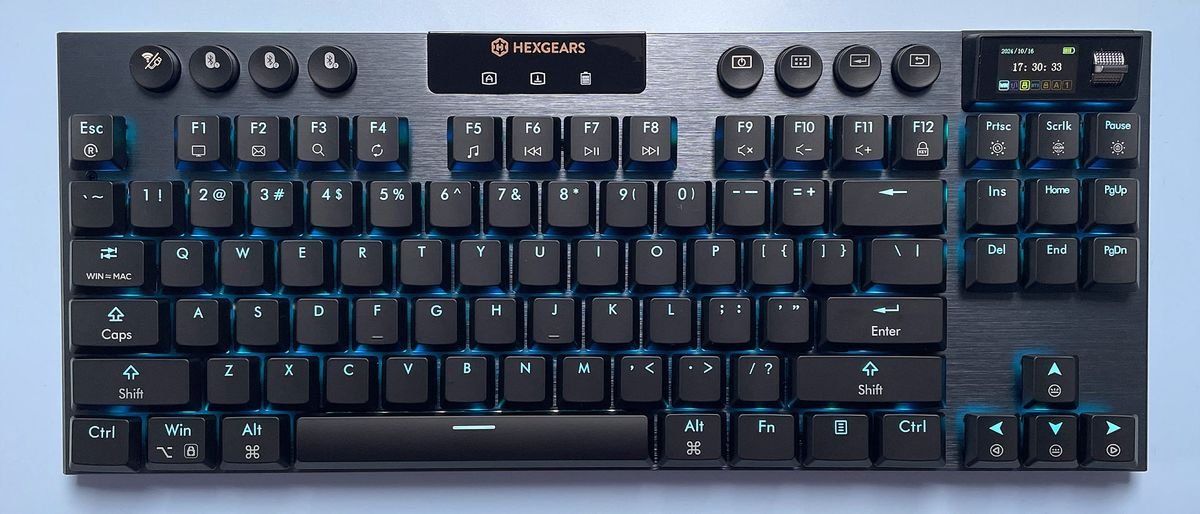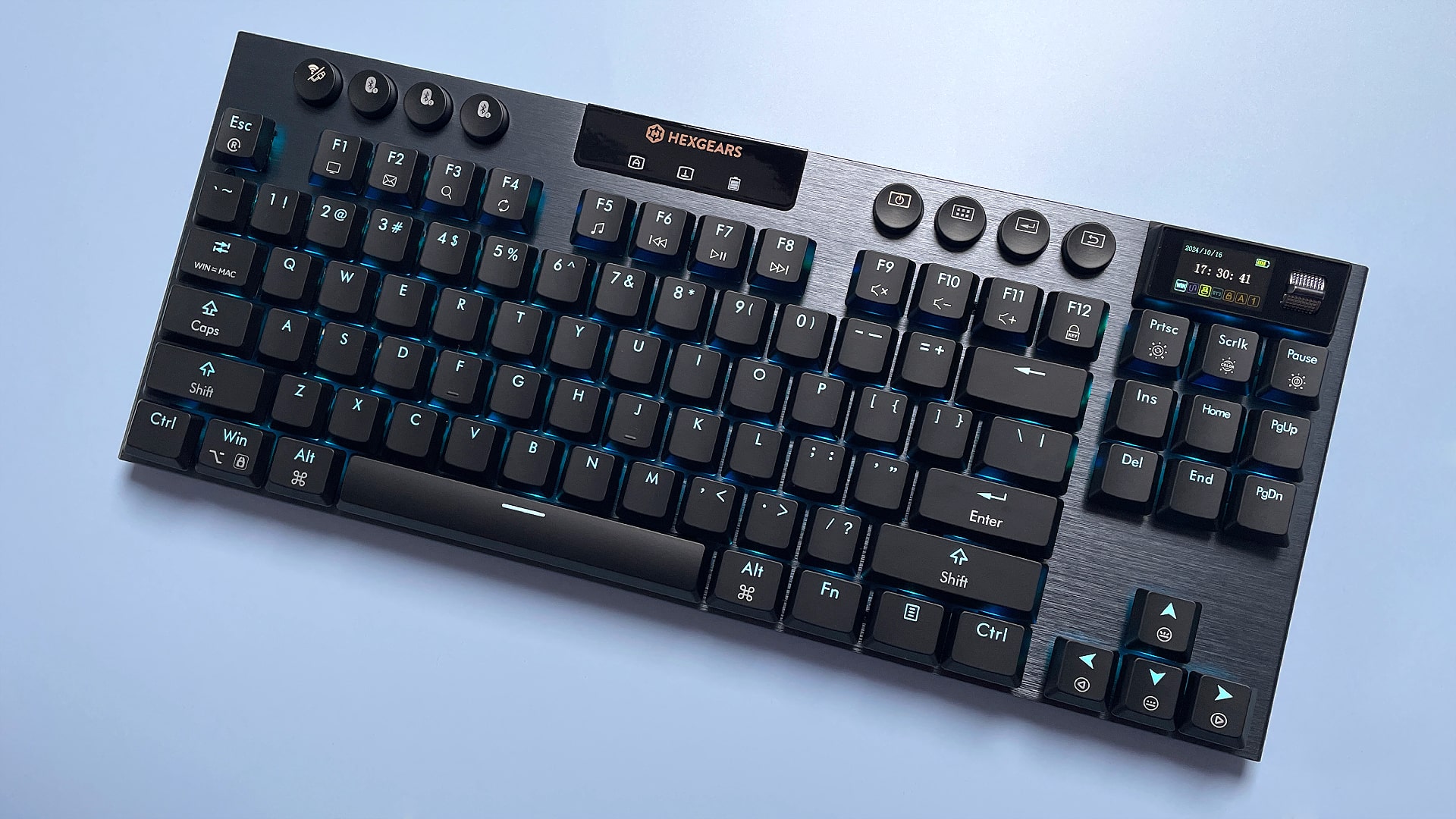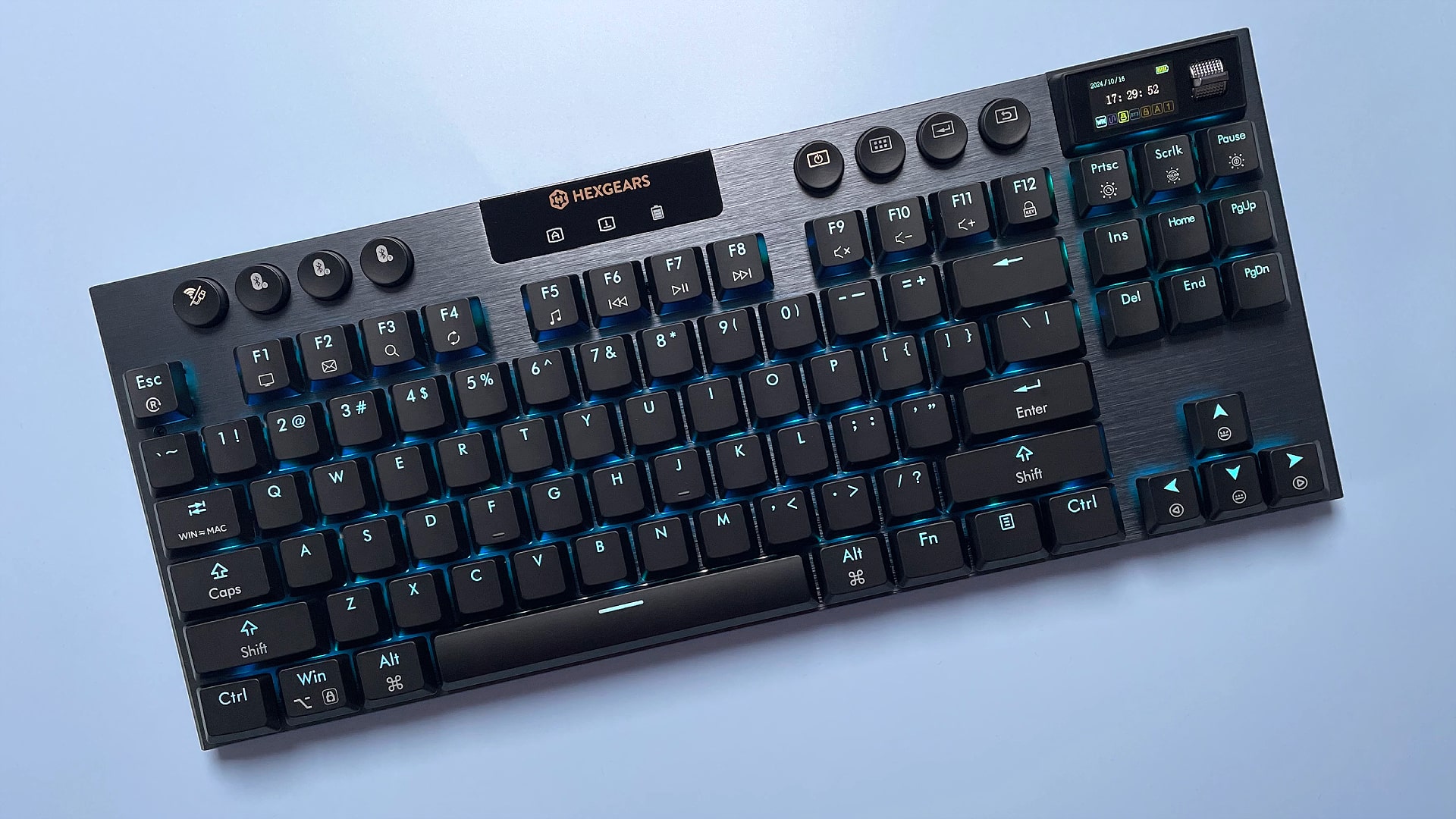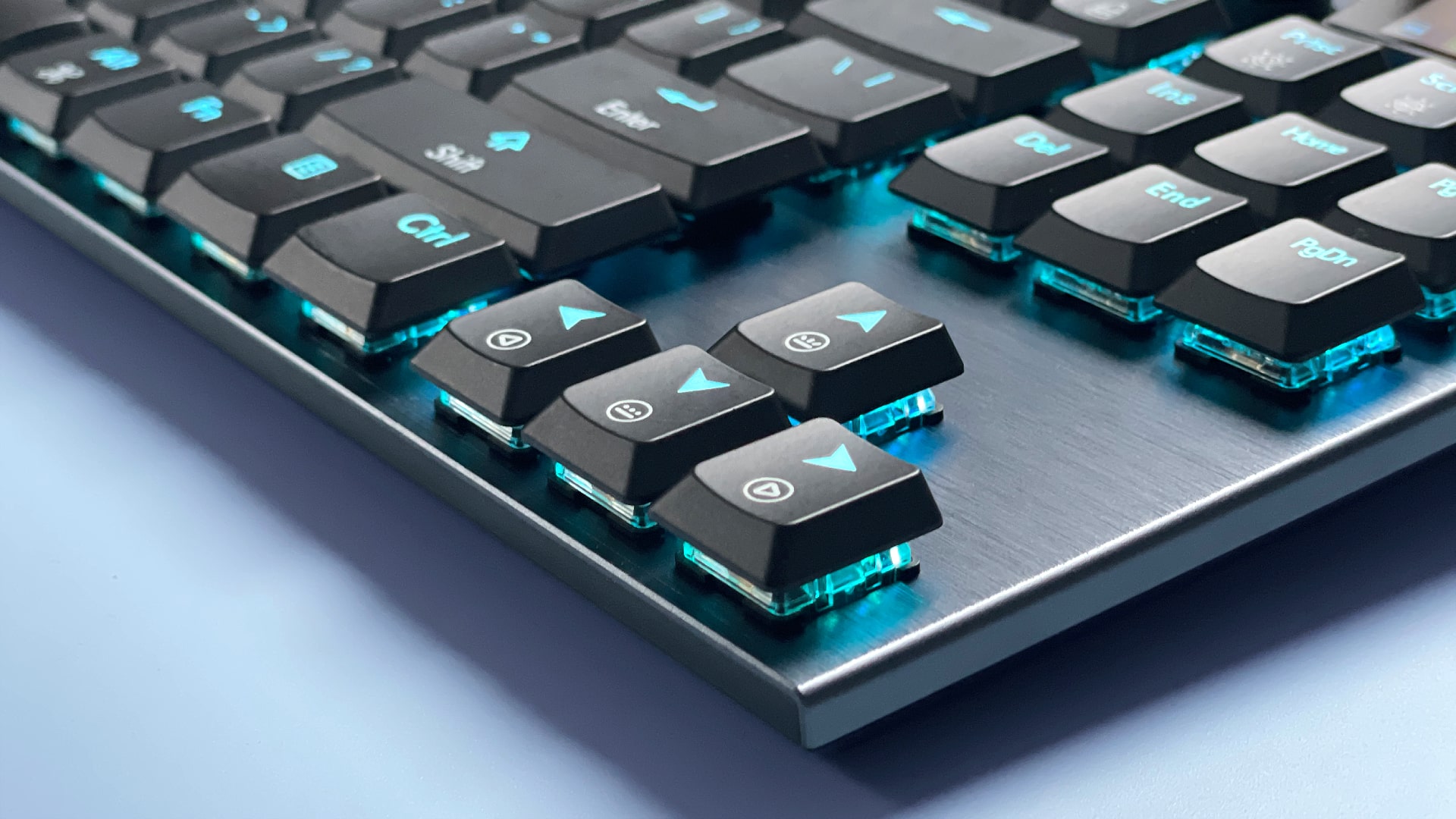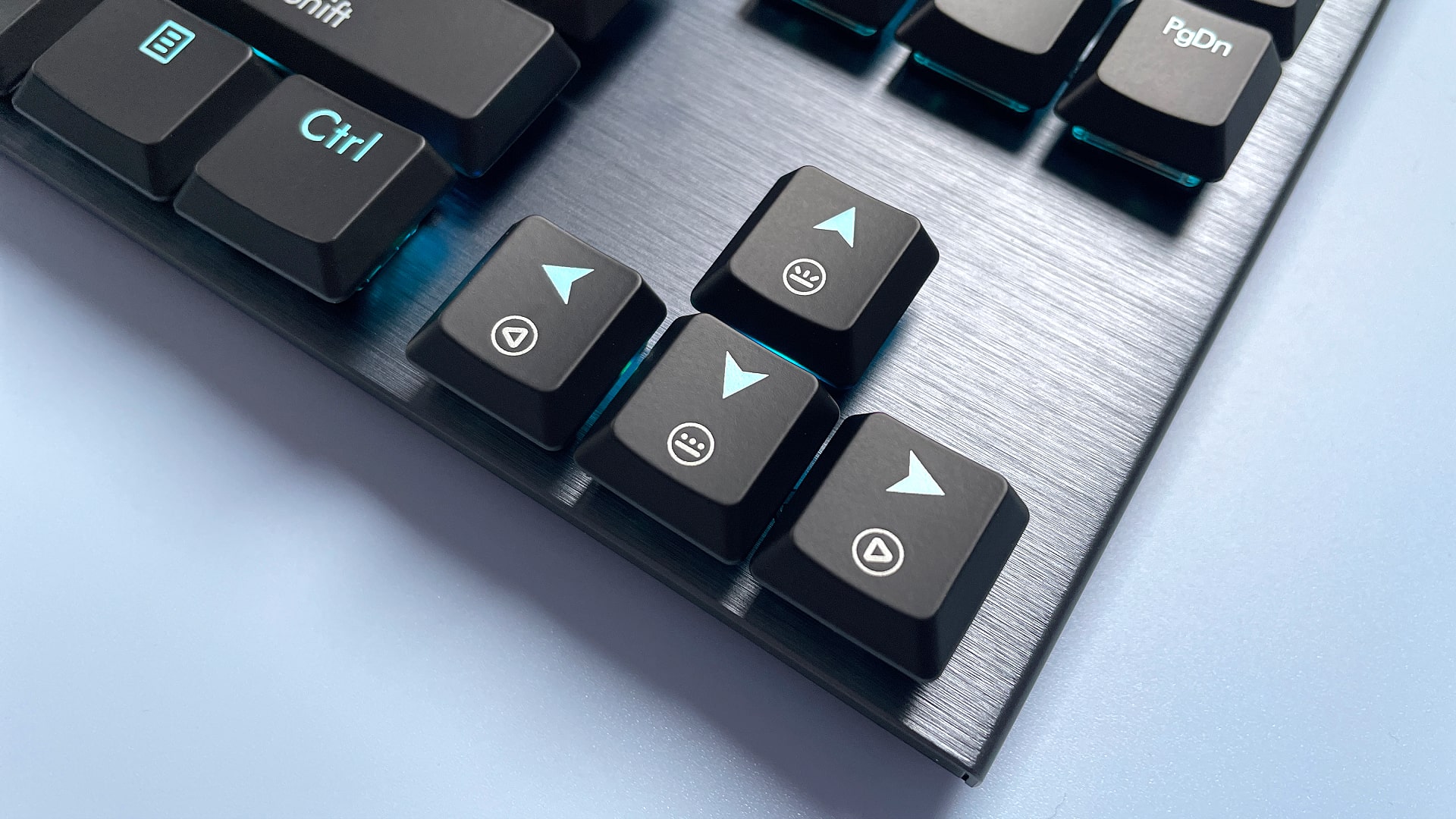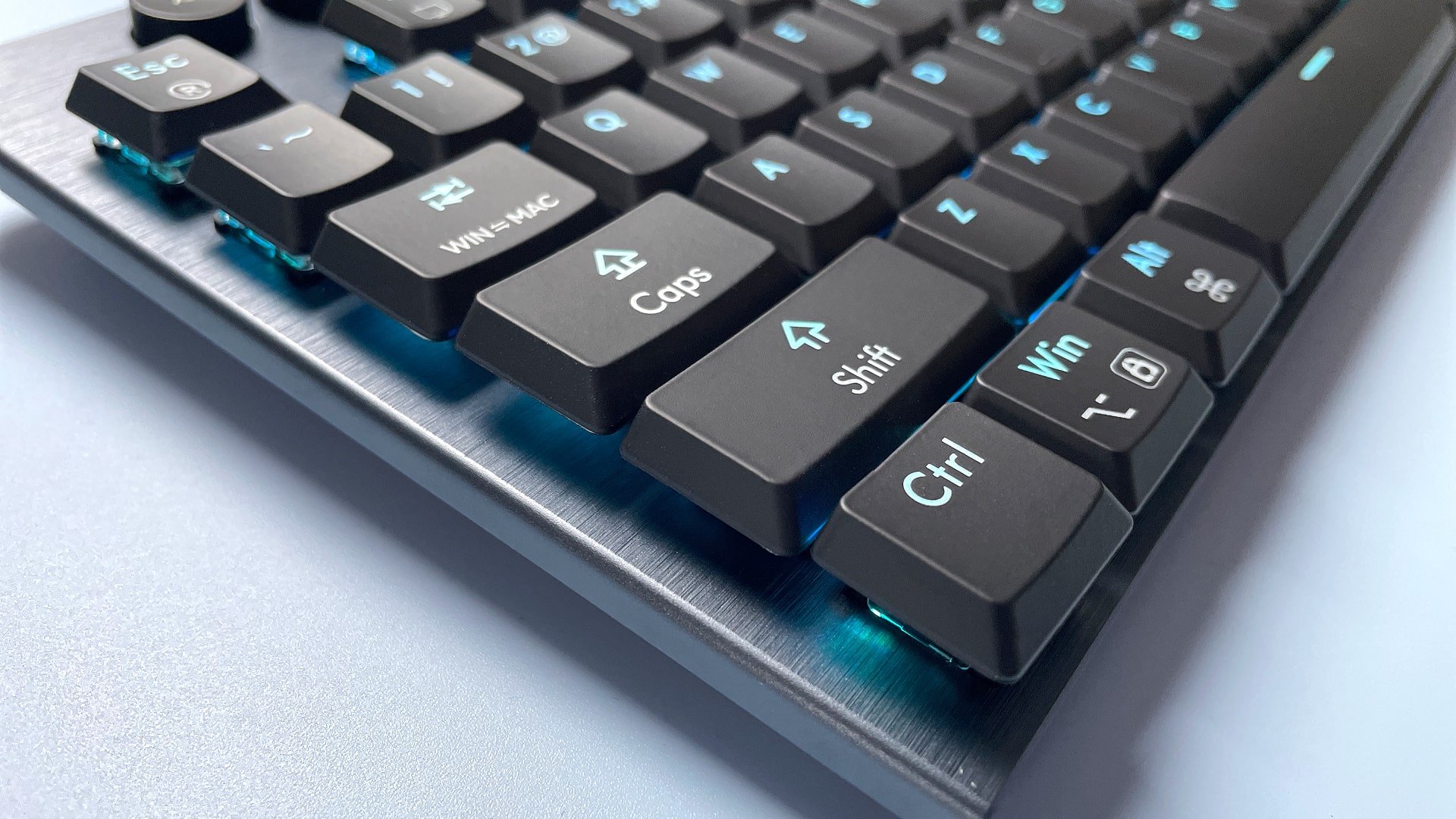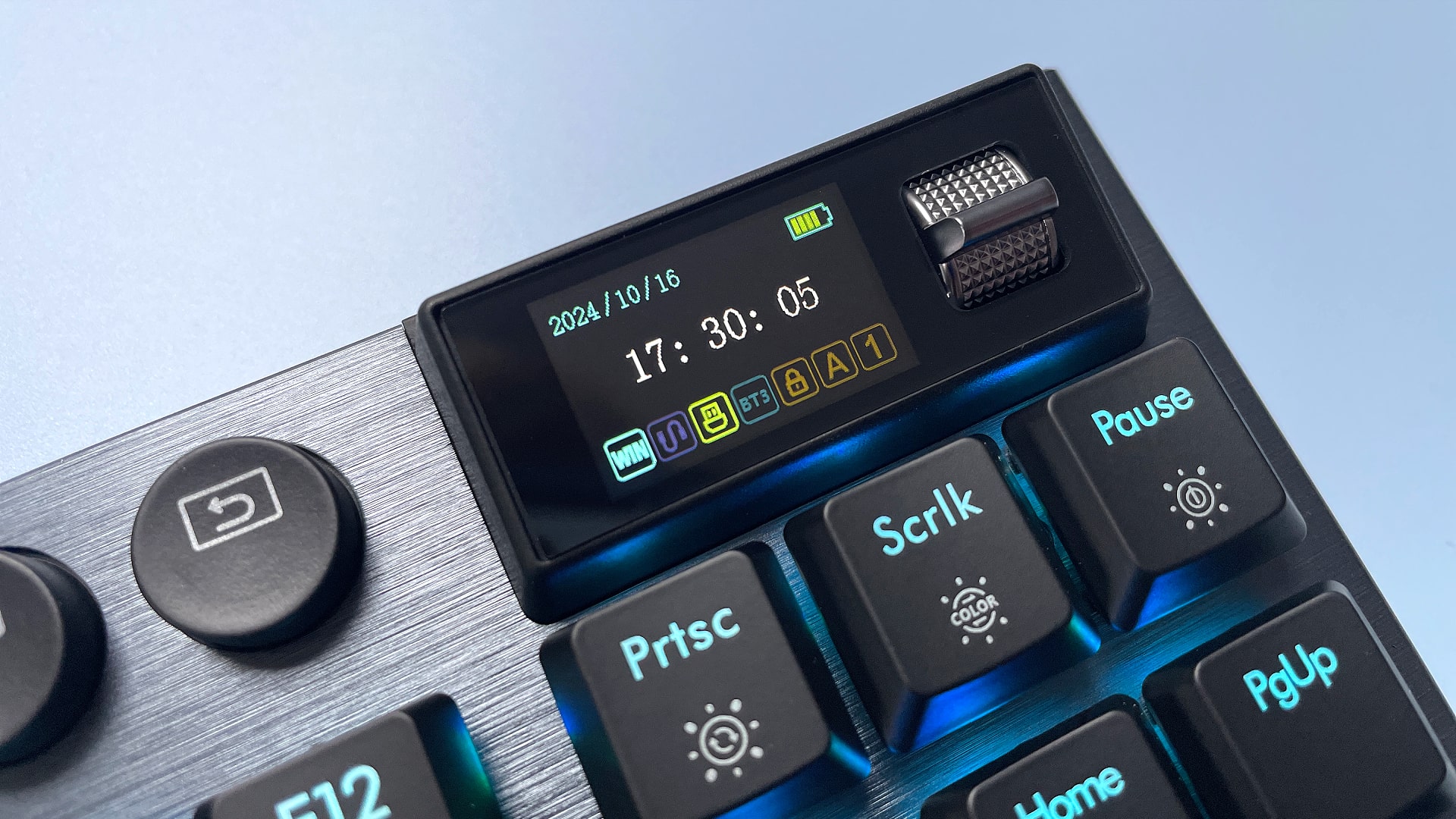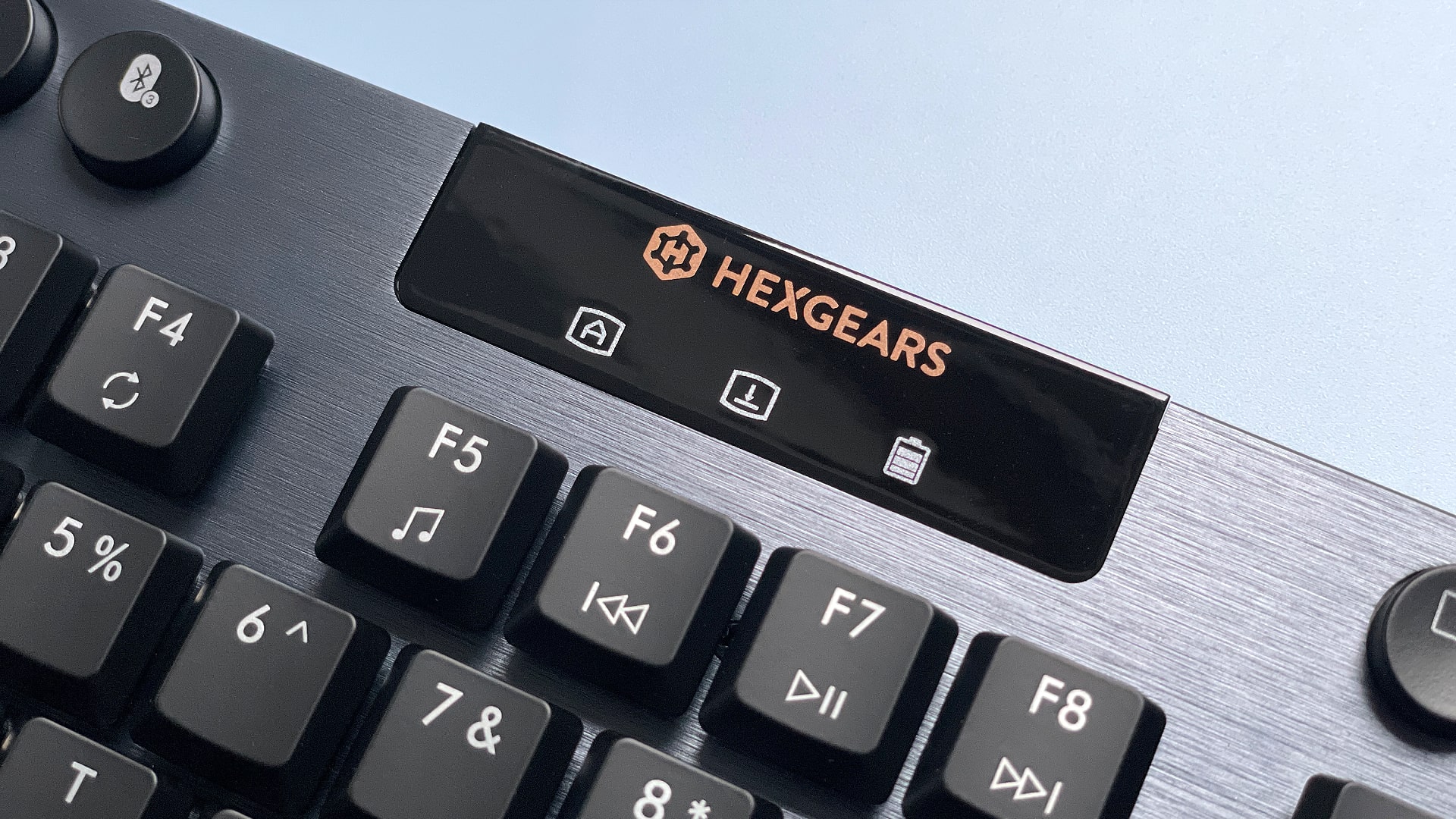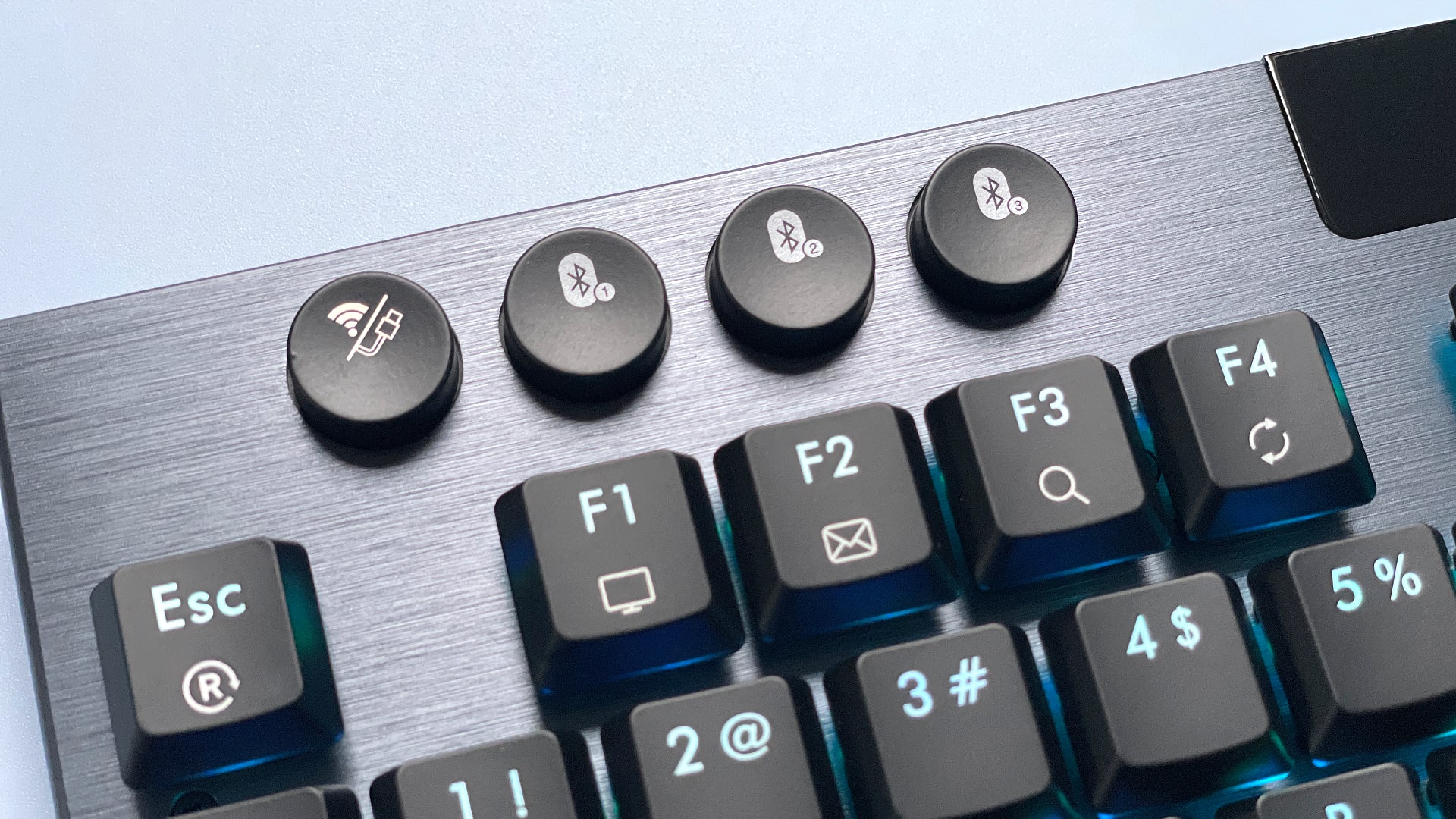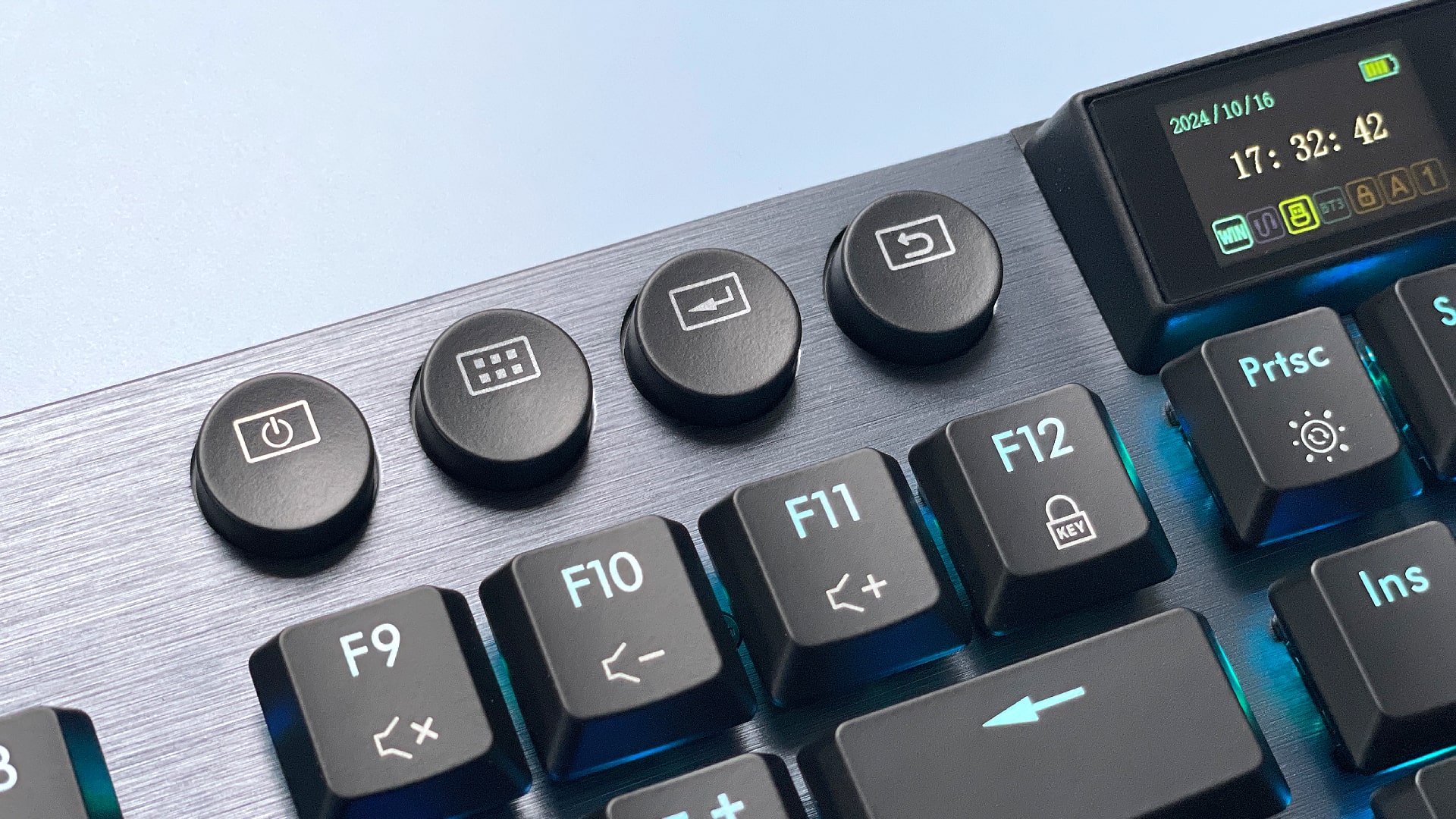Hexgears Immersion A3: Two-minute review
The Hexgears Immersion A3 is a low-profile gaming keyboard with a few neat tricks up its sleeve. It will probably appeal to a fairly niche audience, but if you’re one of those people, it could be just what you’re looking for.
What do I mean by that? Well, this is a keyboard with hot-swappable switches, low-profile keycaps, and a dedicated mini display for changing the RGB backlighting. Those aren’t things everyone will care for, but they’re certainly nice to have if you’re a keyboard enthusiast. Its typing feel is comfortable and it’s solid when it comes to anti-ghosting and input lag, with no problematic keys or combinations that I could detect.
While those are all encouraging signs, the Hexgears Immersion A3 falls short in other areas. Its White Rain linear switches are an acquired taste – not as fast as standard linear switches, but not as comfortable for typing as their clickier siblings. They’re the sort of thing you really need to try to understand if you like them – and that’s not easy for everyone to do.
Still, the Immersion A3 is priced pretty fairly and is by no means a bad keyboard. It grew on me over my time using it, and you might find it’s got the right combination of features for your needs. But it lacks that certain must-have element that makes it a true necessity – there are no special features for gaming, for example – so it isn’t quite able to elevate itself into our picks for the best keyboard around.
Hexgears Immersion A3: Price & availability
- How much does it cost? $129.99 / £99.99 (around AU$195)
- When is it available? Available now
- Where can you get it? Available in the US, UK, and Australia
The Hexgears Immersion A3 costs $129.99 (about £100 or $195 AUD). That’s reasonable (but perhaps a smidge high) considering you get hot-swappable mechanical switches, a really solid build and a built-in mini display.
It can be bought from the Hexgears website and third-party retailers like Amazon.
Hexgears Immersion A3: Design
The most important thing when considering any keyboard is its typing feel, so we’ll start there. The unit I was sent to review came with a set of White Rain switches, which are silent linears made by Kailh. I’m not usually a fan of linears – being someone who writes all day, every day, I prefer clicky switches in my keyboards – and my first impression with the White Rain switches was not good at all. They felt heavy and spongey, much more so than regular linear switches, which means they lose a lot of the speed you expect from this type of switch. Compared to something like the Razer Huntsman V3 Pro and its absolutely rapid linear switches, for example, the difference is night and day.
But the longer I used Hexgears’ White Rain switches, the more they grew on me. Sure, they still don’t compare to the comfort and accuracy of a good set of clicky switches. But they have a few things going for them that make them better for typing than a lot of linear alternatives.
For one thing, they are very quiet, which is ideal for use in the office. For another, their sponginess means they are very soft when pressed. I often find linear switches’ lack of tactility leaves me bottoming out the keys, leading to sore fingers after a few hours. That was never an issue with Hexgears’ Immersion A3.
As well as that, the keyboard’s switches are hot-swappable, so you can replace them if you don’t like them. The Kailh switches used by Hexgears come with two connection pins, so bear that in mind that if you want to change them.
Hexgears has opted for low-profile keycaps made of polycarbonate plastic. They attract smudges like there’s no tomorrow, but they feel smooth and comfortable in use. Unfortunately, the shine-through RGB backlighting is weak due to the lights’ north-facing arrangement, which makes them a little hard to see when you glance down at the keys, especially in daylight.
I also found the low-profile keycaps to be less than ideal for gaming: in the heat of the moment, their smooth, compact design was harder to quickly operate by touch than chunkier traditional keycaps.
Visually, the Immersion A3 looks lovely. Its chassis comprises a brushed metal top plate and sturdy plastic undersides, giving the whole thing a rock-solid feel. On the back are some flip-out feet, but they definitely don’t tilt the keyboard as high as I’d like. Still, its tenkeyless layout is minimal without being overly sparse and comes with a few extra buttons at the top for Bluetooth connectivity and operating the mini display (more on that later). There aren’t any dedicated media buttons, but they’re instead integrated into the function row of keys.
The Immersion A3 comes with an interactive mini display in the top-right corner. This is used to adjust the lighting, show the time or even display an animated GIF, which you can load up using the HexDrive app. You control the display using a dimpled flipper and four buttons to the left of the screen. This is a bit of a sub-optimal arrangement – not only does this extra row of buttons make the keyboard noticeably taller, but a press on the flipper doesn’t actually register until the very bottom of its range of movement, so you sometimes find yourself pressing it without anything happening. It also feels like Hexgears could have perhaps incorporated the buttons into the display or the function row in a more space-saving way.
Hexgears Immersion A3: Performance
The Immersion A3’s typing feel is comfortable and it’s solid when it comes to anti-ghosting and input lag, with no problematic keys or combinations that I could detect. Switching between devices and connectivity methods is fast and responsive. Hexgears says you’ll get 50 hours of life out of its battery and I had no issues here either.
On the software side is the HexDrive app. This lets you create macros, adjust the RGB lighting, save profiles and more. It’s a pretty basic app and its design is very barebones, but it’s useable, if a little confusing at times. There’s no macOS version, though, so you’ll have to go without if you’re not of the Windows persuasion.
Speaking of macOS, the Immersion A3 works with Apple’s computers, and you can switch the layout from Windows to macOS by pressing and holding the Function and Tab keys together. That means you can ensure keys like Option and Command work as expected.
Other than Windows and macOS, the keyboard also works with iOS, iPadOS and Android over Bluetooth. You can connect to a computer using Bluetooth, the included 2.4GHz wireless receiver, or the USB-C to USB-A cable that’s included in the box. If you use Bluetooth, you can switch between three different connected devices, which is a nice touch.
Should you buy the Hexgears Immersion A3?
| Value | At $130 (£100/$195 AUD), the Hexgears Immersion A3 seems fairly priced, if maybe a fraction on the pricey side. For the price, you get a solid build and the ability to swap out its switches. | 4/5 |
| Design | I might be biased, but tenkeyless designs like this are my keyboard preference. I also appreciate the metal top plate but feel like the mini display and top row of buttons could be improved. | 4/5 |
| Performance | The White Rain switches might not please everyone – they’re not as fast as regular linears and not as good for typing as clicky switches. But you do get different switch options before you buy. | 3/5 |
| Average rating | A solid mechanical keyboard with some interesting quirks that could split opinion. | 3.5/5 |
Buy the Hexgears Immersion A3 if…
Don’t buy it if…
Hexgears Immersion A3: Also consider
How we tested the Hexgears Immersion A3
I tested the Hexgears Immersion A3 by using it day-to-day to write articles, browse the web and play games. I connected it to a Windows PC and to a Mac and tried the features of its HexDrive companion app on Windows.
First reviewed October 2024

